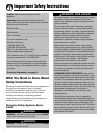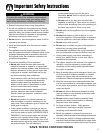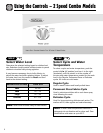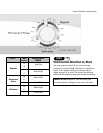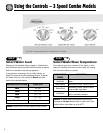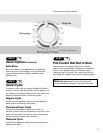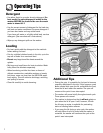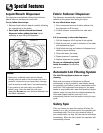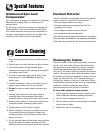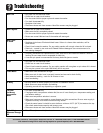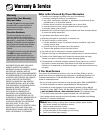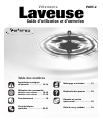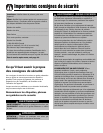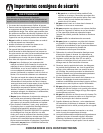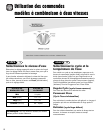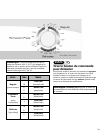
9
Unbalanced Spin Load
Compensator
Your new washer is designed to handle out-of-balance
loads without shutting down or interrupting the
washing cycle.
For this reason, the cycle will always be completed. If
heavier fabrics in such out-of-balance loads should
ever contain excessive moisture at the completion of
the cycle, redistribute the clothes in the washer and
reset the control dial for the final spin period.
Overload Protector
A built-in protector automatically shuts off the washer
motor in case of an overload. This can occur if:
• The load being washed is too heavy.
• Too many appliances are plugged into the line
operating your washer.
• A low voltage condition exists on the line.
• Lid is opened and closed repeatedly.
The overload protector permits the washer to start again
when the motor has cooled to a safe operating temperature.
If the motor stops repeatedly, call your service technician.
Cycles, options, lights
What can & cannot be
w
ashed
operating tips
d
ishwasher use
loading
Controls at a glance
Dryer Exhaust tips
S
afety
C
are & Cleaning
S
ervice & Warranty
Surface Cooking
troubleshooting
Oven Cooking
Storing the washer
Installation
S
pecial Features
Notes
Special Features
C
ycles, options, lights
W
hat can & cannot be
w
ashed
operating tips
dishwasher use
loading
Controls at a glance
Dryer Exhaust tips
Safety
C
are & Cleaning
Service & Warranty
Surface Cooking
troubleshooting
Oven Cooking
Storing the washer
Installation
S
pecial Features
Notes
Care & Cleaning
1. After washing, leave the lid open until the interior
is dry.
2.
Check hoses to be sure there are no kinks or knots.
3. Your washer should not be installed where
temperature
s will go below freezing, as damage to
the washer could re
sult.
4. To clean, occasionally wipe exterior with a clean
damp sponge or cloth.
Do not use polish on
plastic parts.
5. Lifetime lubrication is done at the factory, so your
washer never needs to be oiled or greased.
6.
Do not lay heavy or sharp objects on top of your
washer.
7. The top of the washer should not be used for
removing stains from garments. Some stain
removers, such as rust remover
, will mar the finish.
8.
Remove pins, buckles or other sharp objects from
clothes to prevent scratching interior parts.
9.
Clothe
s should not be stored in washer.
10. Bleach, detergent, solvents, etc. spilled on the top
of your washer that are allowed to remain will
remove the glossy finish. Remove all spills with a
damp, soft cloth.
11. If you close your home for the winter, have a service
technician drain the washer. Unplug cord from
electric
al outlet and disconnect hose
s from faucet
s.
Cleaning the Interior
Clean the interior of the washer periodic
ally to remove
any dirt, soil, odor, mold, mildew or bacteria residue
that may remain in the washer as a result of washing
clothes. We recommend t
aking the following steps
every 60 to 120 days to clean and freshen your washer
interior. The frequency with which the washer should
be cleaned and freshened depends on factors such as
usage, the amount of dirt, soil or bacteria being run
through your washer, or the use of cold water. Failure
to follow these instructions may result in unsatisfactory
conditions, including unpleasant odor and/or
permanent stains on the washer or washload.
To clean and freshen the washer interior:
1. Add a measured amount of chlorine bleach to the
bleach dispenser, following package directions.
2. Add 1/4 cup of detergent to the tub.
3.
Run the washer without a load through a complete
cycle using hot water.
4. Repeat the process if necessary.



